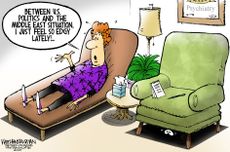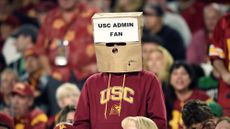Public pensions are in better shape than you think
"Underfunded" doesn't mean what it sounds like


The beleaguered condition of state and local pension plans is one of those ongoing disaster stories that crops up about once a week somewhere. The explanation usually goes something like this: Irresponsible politicians and greedy public employee unions created over-generous benefit schemes, leading to pension plans which aren't "fully-funded" and eventual fiscal crisis. That in turn necessitates benefit cuts, contribution hikes, or perhaps even abolishment of the pension scheme.
But a fascinating new paper from Tom Sgouros at UC Berkeley's Haas Institute makes a compelling argument that the crisis in public pensions is to a large degree the result of terrible accounting practices. (Stay with me, this is actually interesting.) He argues that the typical debate around public pensions revolves around accounting rules which were designed for the private sector — and their specific mechanics both overstate some dangers faced by public pensions and understate others.
To understand Sgouros' argument, it's perhaps best to start with what "fully-funded" means. This originally comes from the private sector, and it means that a pension plan has piled up enough assets to pay 100 percent of its existing obligations if the underlying business vanishes tomorrow. Thus if existing pensioners are estimated to collect $100 million in benefits before they die, but the fund only has $75 million, it has an "unfunded liability" of $25 million.
Subscribe to The Week
Escape your echo chamber. Get the facts behind the news, plus analysis from multiple perspectives.

Sign up for The Week's Free Newsletters
From our morning news briefing to a weekly Good News Newsletter, get the best of The Week delivered directly to your inbox.
From our morning news briefing to a weekly Good News Newsletter, get the best of The Week delivered directly to your inbox.
This approach makes reasonably good sense for a private company, because it really might go out of business and be liquidated at any moment, necessitating the pension fund to be spun off into a separate entity to make payouts to the former employees. But the Government Accounting Standards Board (GASB), a private group that sets standards for pension accounting, has applied this same logic to public pension funds as well, decreeing that they all should be 100 percent funded.
This makes far less sense for governments, because they are virtually never liquidated. Governments can and do suffer fiscal problems or even bankruptcy on occasion. But they are not businesses — you simply can't dissolve, say, Arkansas and sell its remaining assets to creditors because it's in financial difficulties. That gives governments a permanence and therefore a stability that private companies cannot possibly have.
The GASB insists that it only wants to set standards for measuring pension fund solvency. But its analytical framework has tremendous political influence. When people see "unfunded liability," they tend to assume that this is a direct hole in the pension funding scheme that will require some combination of benefit cuts or more funding. Governments across the nation have twisted themselves into knots trying to meet the 100-percent benchmark.
While all pensions have contributions coming in from workers, the permanence of those contributions is far more secure for public pensions. Plus, those contributions can be used to pay a substantial fraction of benefits.
Indeed, one could easily run a pension scheme on a pay-as-you-go basis, without any fund at all (this used be common). That might not be a perfect setup, since it wouldn't leave much room for error, but practically speaking, public pension funds can and do cruise along indefinitely only 70 percent or so funded.
This ties into a second objection: How misleading the calculation for future pension liabilities is.
A future pension liability is determined by calculating the "present value" of all future benefit payments, with a discount rate to account for inflation and interest rates. But this single number makes no distinction between liabilities that are due tomorrow, and those that are due gradually over, say, decades.
Fundamentally, a public pension is a method by which retirees are supported by current workers and financial returns, and one of its great strengths is its long time horizon and large pool of mutual supporters. It gives great leeway to muddle through problems that only crop up very slowly over time. If huge problems really will pile up, but only over 70 years, there is no reason to lose our minds now — small changes, regularly adjusted, will do the trick.
Finally, a 100-percent funding level — the supposed best possible state for a responsible pension manager — can actually be dangerous. It means that current contributions are not very necessary to pay benefits, sorely tempting politicians to cut back contributions or increase benefits. And because asset values tend to fluctuate a lot, this can leave pension funds seriously overextended if there is a market boom — creating the appearance of full funding — followed by a collapse. Numerous state and local public pensions were devastated by just this process during the dot-com and housing bubbles.
I have skipped past several more technical objections from Sgouros (whose paper is really worth reading). But the fundamental point here is fairly simple. Accounting conventions are supposed to help people think clearly about their financial health. But in the case of public pensions, they have warned of partly imaginary danger, pushing governments to stockpile vast asset hoards that are much larger than is necessary, and created a goal which is itself rather dangerous. The next time you see someone complaining about a pension funding shortfall, check the details carefully.
Create an account with the same email registered to your subscription to unlock access.
Sign up for Today's Best Articles in your inbox
A free daily email with the biggest news stories of the day – and the best features from TheWeek.com
Ryan Cooper is a national correspondent at TheWeek.com. His work has appeared in the Washington Monthly, The New Republic, and the Washington Post.
-
 Today's political cartoons - April 17, 2024
Today's political cartoons - April 17, 2024Cartoons Wednesday's cartoons - political anxiety, jury sorting hat, and more
By The Week US Published
-
 Arid Gulf states hit with year's worth of rain
Arid Gulf states hit with year's worth of rainSpeed Read The historic flooding in Dubai is tied to climate change
By Peter Weber, The Week US Published
-
 USC under fire for canceling valedictorian speech
USC under fire for canceling valedictorian speechSpeed Read Citing safety concerns, the university canceled a pro-Palestinian student's speech
By Rafi Schwartz, The Week US Published
-
 Arizona court reinstates 1864 abortion ban
Arizona court reinstates 1864 abortion banSpeed Read The law makes all abortions illegal in the state except to save the mother's life
By Rafi Schwartz, The Week US Published
-
 Trump, billions richer, is selling Bibles
Trump, billions richer, is selling BiblesSpeed Read The former president is hawking a $60 "God Bless the USA Bible"
By Peter Weber, The Week US Published
-
 The debate about Biden's age and mental fitness
The debate about Biden's age and mental fitnessIn Depth Some critics argue Biden is too old to run again. Does the argument have merit?
By Grayson Quay Published
-
 How would a second Trump presidency affect Britain?
How would a second Trump presidency affect Britain?Today's Big Question Re-election of Republican frontrunner could threaten UK security, warns former head of secret service
By Harriet Marsden, The Week UK Published
-
 'Rwanda plan is less a deterrent and more a bluff'
'Rwanda plan is less a deterrent and more a bluff'Instant Opinion Opinion, comment and editorials of the day
By The Week UK Published
-
 Henry Kissinger dies aged 100: a complicated legacy?
Henry Kissinger dies aged 100: a complicated legacy?Talking Point Top US diplomat and Nobel Peace Prize winner remembered as both foreign policy genius and war criminal
By Harriet Marsden, The Week UK Last updated
-
 Trump’s rhetoric: a shift to 'straight-up Nazi talk'
Trump’s rhetoric: a shift to 'straight-up Nazi talk'Why everyone's talking about Would-be president's sinister language is backed by an incendiary policy agenda, say commentators
By The Week UK Published
-
 More covfefe: is the world ready for a second Donald Trump presidency?
More covfefe: is the world ready for a second Donald Trump presidency?Today's Big Question Republican's re-election would be a 'nightmare' scenario for Europe, Ukraine and the West
By Sorcha Bradley, The Week UK Published